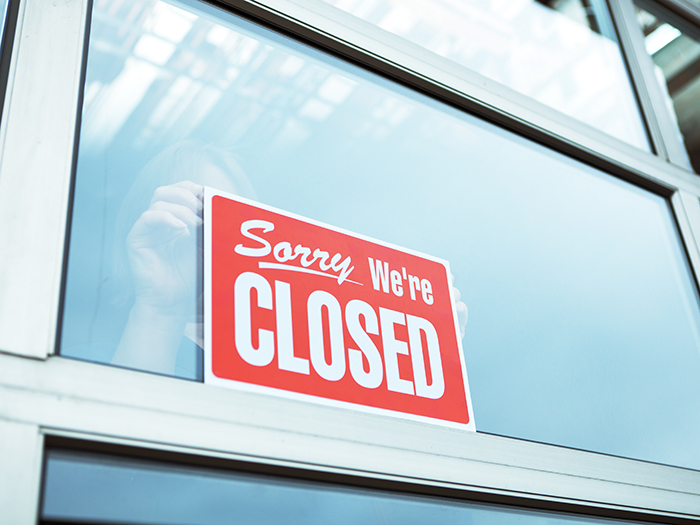Sponsored Content by Nationwide
COVID-19 Risks Threaten the Resiliency of Private Companies

The novel coronavirus has delivered many valuable lessons along with its widespread global impact. While the long-term repercussions are yet to be fully known, one thing is certain: the need to be resilient during crisis is critical.
Companies are striving to ensure economic stability for all concerned. A company must balance its need to generate revenue with the personal needs of employees who are concerned with their earnings, family safety, and overall health and well-being.
“This is one of the biggest concerns we currently have while talking with our brokers and clients,” said Joe Werner, Nationwide, Management Liability and Specialty.
“We’ve found that in order for companies to be responsive and remain operational, they need balance and stability,” Werner added. “This starts with understanding the need for resiliency and the array of risks accompanying this time of crisis.”
Understanding risk is only one piece of the puzzle. Successful companies, according to Werner, will be the ones that are proactive, have policies and procedures in place, and are pliable.
“Those four Ps are always important. During a crisis, they become crucial,” he said.
Here’s a look at five risks threatening resiliency in a crisis, and the key methods a company can use to combat them.
1) Data security threats are on the rise as businesses turn to work-from-home.

Joseph Werner, Associate Vice President, Private Company Package Policy, Management Liability and Specialty, Nationwide
When a crisis event hits, governments may need to enact protective measures and businesses may require alternative means to keep functioning. The current Coronavirus spread provides a perfect example: many states throughout the country put shelter-in-place edicts into effect; non-essential businesses closed while essential businesses drastically changed their day-to-day operations to better comply with safety guidelines.
Companies, in order to adhere to social distancing standards and to curb the spread of the virus, elected to have employees work from home. Fortunately, technology has paved the way for success in this area.
However, with employees scattered, the use of personal networks to conduct business has left companies vulnerable to data security threats.
“Protecting data becomes more challenging,” said Werner. “Employees are working remotely, and formerly closed-door meetings and conversations are now taking place online using video chat or remote meeting software. Employees are making phone calls on personal cellular devices and sending information through unsecure wi-fi and cellular networks.”
“A company’s data could be a potential target and there are few ways to ensure that all employees are maintaining proper security for their data all the time,” he added.
2) Health privacy is more of a concern as employees share their own health issues.
While some companies pivoted to work from home, others remained open.
Essential businesses, like supermarkets and grocery stores, health care facilities, trucking and distribution, home repair shops and others, have remained operational throughout the pandemic. Employers have had to decide how best to handle their employees’ safety and health concerns.
“Any time a crisis could affect someone’s health, such as the current COVID-19 pandemic or even other public health challenges such as a local Legionnaire’s outbreak, companies addressing employee health concerns could find themselves handling sensitive data about employees,” said Werner.
Companies must have policies and procedures in place to protect individuals’ private information and limit exposure to privacy-related liability. “States such as California and Illinois have laws recognizing that employees have an expectation of privacy in the workplace, and some laws specify how private information should be handled. That includes health information, which just may be the most sensitive information in the eyes of an employee,” Werner said.
3) FMLA concerns may be heightened by any type of crisis.
“A crisis affects everyone, not just employees. Employees’ spouses, parents, children and other family members will also be impacted and there may be a need for employees to care for loved ones or tend to children at home,” Werner said.
The Family and Medical Leave Act, or FMLA, provides protections for employees who need extended time to care for a family member. During a crisis and for a time afterward, the number of employees seeking the protections of FMLA leave may increase.
“Businesses should consult with counsel and HR professionals to fully understand employee rights under the FMLA and similar state laws to address any compliance concerns,” Werner said. “Doing all that is necessary under these laws will protect employers from significant liability should an employee make a claim against them.”
4) Furloughs and layoffs present potential discrimination concerns.
A crisis such as the current pandemic can place severe economic stress on businesses, requiring workforce actions like layoffs and furloughs. It is a difficult message to deliver to affected employees. Unfortunately, some companies cannot withstand the stress and there is often no option other than to cut jobs, sometimes turning furloughs into permanent layoffs. For others, the furlough remains temporary and employees will be able to return to work within a reasonably short period.
Layoffs and furloughs, while all based on business need, have the potential to expose companies to employment lawsuits. Accordingly, companies must make these difficult decisions after careful consideration, applying established policies and sound reasoning.
“Even legitimate employment actions based on business need can have adverse consequences. The result of a layoff cannot disparately impact any class of individuals protected by anti-discrimination laws. If, for example, the data shows that workers over the age of forty were disproportionately impacted by the employment action, then employers may be liable under anti-discrimination laws, even though what they did seemed appropriate based on business need,” said Werner. “That’s why it’s so important that before layoffs are made, employers should consult with HR and legal experts to ensure compliance with employment laws. If there are red flags in the proposed layoff, then companies need to make proper adjustments to comply with the law.”
5) Employers still doing business and employers getting back to business must address employee concerns.
Some companies may remain open during a crisis, and as a crisis dissipates some companies will begin to reopen and bring their employees back to the workplace. In either case, employees may be anxious about working, and some employees may have health issues that are exacerbated because of a crisis. Employee safety issues are typically considered to be governed under OSHA and similar state laws. Employers should remember, however, not to overlook the requirements of the Americans with Disabilities Act, or ADA. “Some employees may request reasonable accommodations if they have concern over their health issues,” said Werner. “Employers with proper HR policies in place will take these requests seriously and they will go through the interactive process required under disability laws to determine whether a reasonable accommodation can be made for the employee.”
“Employers should resist acting hastily. If an employee makes a request for an accommodation based on health concerns, employers must engage in the interactive process,” Werner said. “If adverse employment actions are taken before the process is complete, employers open themselves to potential retaliation claims.”
Key Ways Companies Can Be Successful During A Crisis
As Werner has emphasized, companies that are proactive, have policies and process in place, and are pliable in times of crisis will yield success after success as they navigate any crisis.
“The current crisis brings change every day,” he said. “Resiliency in the face of COVID-19 and any other crisis has to start from the top down.”
All leaders of the company must be on board. Maintaining communication with employees and providing regular updates concerning work and company policy will help employees feel engaged and should go a long way to ease anxiety. Werner added, “It’s important to have a clear return-to-work strategy developed beforehand. That could mean incorporating local requirements, applying company policies and proper HR procedures, giving employees the opportunity to express their concerns, and preparing the workplace for their return.”
Werner also recommends that companies be ready to receive employee complaints.
“You want a process for receiving complaints before they come in, from intake through investigation and ultimately, resolution.” A clear process for allowing and responding to employee criticism fosters a culture of transparency and will help ease anxieties in a time of crisis.
And finally, Werner urges, companies must be flexible when it comes to changing times.
“Employers need to be pliable and understand that a crisis can affect employees in different ways, especially during the unprecedented one that everyone is facing today. It’s a sensitive time. Flexibility will go a long way to create a culture within the company upon which employees can trust and rely.”
To learn more about Nationwide’s resiliency efforts, visit https://www.nationwide.com/personal/about-us/coronavirus
For more information on Nationwide’s Private Company Package Policy, visit https://mls.nationwideexcessandsurplus.com/fs/products/private-company-management-liability/
or contact Joe Werner, Associate Vice President, at 212-329-6961 or [email protected].
About Nationwide
A.M. Best Rated A+ XV | S&P A+ | Fortune 100 Company
Products underwritten by Nationwide Mutual Insurance Company and Affiliated Companies. Not all Nationwide affiliated companies are mutual companies, and not all Nationwide members are insured by a mutual company. Home Office: One Nationwide Plaza, Columbus, OH. Nationwide, the Nationwide N and Eagle, and other marks displayed on this page are service marks of Nationwide Mutual Insurance Company, unless otherwise disclosed. © 2020 Nationwide Mutual Insurance Company.
This article was produced by the R&I Brand Studio, a unit of the advertising department of Risk & Insurance, in collaboration with Nationwide. The editorial staff of Risk & Insurance had no role in its preparation.










